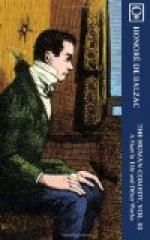Pierrotin, a man about forty years of age, was already the father of a family. Released from the cavalry on the great disbandment of 1815, the worthy fellow had succeeded his father, who for many years had driven a coucou of capricious flight between Paris and Isle-Adam. Having married the daughter of a small inn-keeper, he enlarged his business, made it a regular service, and became noted for his intelligence and a certain military precision. Active and decided in his ways, Pierrotin (the name seems to have been a sobriquet) contrived to give, by the vivacity of his countenance, an expression of sly shrewdness to his ruddy and weather-stained visage which suggested wit. He was not without that facility of speech which is acquired chiefly through “seeing life” and other countries. His voice, by dint of talking to his horses and shouting “Gare!” was rough; but he managed to tone it down with the bourgeois. His clothing, like that of all coachmen of the second class, consisted of stout boots, heavy with nails, made at Isle-Adam, trousers of bottle-green velveteen, waistcoat of the same, over which he wore, while exercising his functions, a blue blouse, ornamented on the collar, shoulder-straps and cuffs, with many-colored embroidery. A cap with a visor covered his head. His military career had left in Pierrotin’s manners and customs a great respect for all social superiority, and a habit of obedience to persons of the upper classes; and though he never willingly mingled with the lesser bourgeoisie, he always respected women in whatever station of life they belonged. Nevertheless, by dint of “trundling the world,”—one of his own expressions,—he had come to look upon those he conveyed as so many walking parcels, who required less care than the inanimate ones,—the essential object of a coaching business.
Warned by the general movement which, since the Peace, was revolutionizing his calling, Pierrotin would not allow himself to be outdone by the progress of new lights. Since the beginning of the summer season he had talked much of a certain large coach, ordered from Farry, Breilmann, and Company, the best makers of diligences,—a purchase necessitated by an increasing influx of travellers. Pierrotin’s present establishment consisted of two vehicles. One, which served in winter, and the only one he reported




